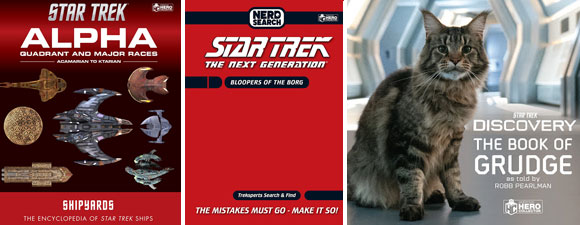These Are The Voyages TOS Season One Book Review
3 min read
A new book, the first in a trilogy, These are the Voyages TOS Season One, written by Marc Cushman and Susan Osborn, has just been released.
Five hundred and eighty pages in length, These are the Voyages TOS Season One gives readers the story behind the creation of Star Trek, and details about each episode from that inaugural season.
These are the Voyages TOS Season One begins with a foreword by John D.F. Black, who was an associate producer during the first season of the original series, and his wife Mary. Black also wrote the first season episode The Naked Time. This foreword is then followed by a preface from Cushman.
As one would expect, the story of Star Trek begins with its creator, Gene Roddenberry, and the book provides a detailed biography of Roddenberry and details the history of his early days in television.
This is followed by chapters on pitching Star Trek, designing the show, the pilots, and then chapters on each episode. Each chapter is written in the following format:
- Description of the episode
- Sound bites (notable lines from the episode)
- Assessment of the episode
- Story behind the story
- Pre-production
- Production diary
- Post-production
- Release/reactions to the episode
- Ratings for the episode
- From the mailbag – fan response to the episode
- Memories of the episode
- Aftermath
Other chapters sprinkled throughout the book include: Deadlines, Breakdowns, and Replacements; America Meets Star Trek Mid-Season 1966; Ratings, Reactions, Repeats (and Rewards).
The appendix includes an index of first season story assignments (in order), episodes in filming order (including names of directors), and airdates of the first season episodes.
A bibliography, quote index and memo/letters index completes the book.
Review:
It was fascinating to read how each story evolved until it became what eventually aired on television. Various conflicts and controversies are presented, such as Roddenberry’s tendency to rewrite stories, and the release of Grace Lee Whitney from the show. Readers will also discover what the censors allowed and didn’t allow back in those more restrictive days of television.
Guest actors shared their memories of working on an episode, and readers will learn what those actors were doing prior to their appearances on Star Trek.
Under the release/reactions section of each chapter, the Nielsen ratings for that episode are given, and readers can see how the episode stacked up against the competition the night it aired. Readers can also discover how much the series regulars made for each episode.
These are the Voyages TOS Season One has information for everyone; for those interested in how the show began, for those wanting behind-the-scenes information, for those who are interested in the technical details of the series, for those wanting the human story, and for those who like details.
It will be interesting to see where the next volume in this trilogy will go and what that volume will reveal. In the meanwhile, enjoy the rich detail of These are the Voyages TOS Season One. It takes a while to get through the entire book, but I suspect that this is a book that readers will read more than once and a book which will be a useful reference guide to the original series.
Excerpts from the book can be seen here.
These Are The Voyages TOS Season One can be purchased here, or from Amazon, where shipping is free for Amazon Prime members. The price for These Are The Voyages TOS Season One is $39.95.






Awesome! The REAL Trek.
Sounds very intriguing!!
As opposed to abramstrek, definitely.
Book review – These are the Voyages
http://borg.com/2013/07/30/exhaustive-compelling-new-volume-is-a-must-for-star-trek-fans/
Agreed.
There have been several dozen “making of” books about the original series over the decades, and I own most of them (the Whitfield book, the Gerrold books, the Compendium, “Inside Star Trek”, to name a few), and so at this point in time I’m usually skeptical about new ones that are announced. I expect them to be glorified coffee-table books, or sterile rehashes of long-trodden ground. Many of the recent books are like this.
But after reading the two excerpts on the publisher’s site (concerning “Shore Leave” and “The Alternative Factor”), I will be buying this book. I am impressed with what I’m reading here, and if it’s typical of the rest of the book (and of the coming second and third ones) then these could very well be the definitive, one-stop volumes for the production history of TOS. Am looking forward to this.
Yeah, because into darkness wasn’t a thinly veiled metaphor for some of the troubles facing the world today. There was nothing about the prime directive and there were no characters called Kirk, Spock and McCoy. It was absolutely different.
If there was a subtext in that poorly written mess, please, do tell.
The part about the Prime Directive was a whopping 10 minutes at the very beginning of the movie… and the characters and situation was extremely stupid, so I may have missed some subtext… tell me, what was the point of that opening with regard to modern culture? I thought it was just a way for them to actually include aliens and a couple visual effects sequences… because it certainly wasn’t to further the story…. Allow me to explain: So, at some point they go to that planet and realize that the volcano is about to explode. The Prime Directive clearly demands that they allow the volcano to erupt and destroy the indigenous life… the natural course of the planet’s evolution. Kirk and Spock and the crew decide to submerge the ship (because, apparently, that somehow enhances the transporter), and somehow do so without being seen. AT THAT VERY POINT THEY HAVE VIOLATED THE PRIME DIRECTIVE. So, when the volcano is stopped from erupting, the natural course of that planet has been altered. The idiot writers then have Spock turn on Kirk, attempting to rat him out for HIS and ONLY HIS violation of the Prime Directive in the attempt to save Spock… to save Spock while Spock was in the middle of violating the Prime Directive. But, with that said, I guess I missed the point. Are we Spock? Pointing out the rules while violating a different set? Or are we Kirk? Or maybe we’re the wayward Admiral Pike at that point? If it’s a metaphor for today’s world, what is the metaphor therein? You mentioned it, not me… So, let’s have it.
As far as there being characters named Kirk, Spock and McCoy, too true… those names are there. Shame the characters are conspicuously absent.
Kirk isn’t Han Solo. He doesn’t need to be busted down to Ensign, or whatever, every time something happens. And, Kirk also doesn’t need some guy from the future of a different universe to explain to Spock why Spock and he should be friends… they just should be, and they should learn to trust each other based on each other, not, again, some guy from the future. The only reason to have Nimoy there in the first place is to actually tell them 2 things: 1) Khan’s bad, don’t trust him and 2) You and Kirk are supposed to be besties… Don’t actually show Khan as dangerous. Don’t give those people/characters a reason to actually fight/hate him, or to like and embrace Kirk on his own merits… mostly because all the merits Kirk actually is supposed to have have been stripped away by Abrams in his quest to Soloify Kirk…
But, maybe the part you’re talking about being metaphor was something you didn’t mention but thought was obvious…. So, what was that part? Was it terrorism? Because Khan wasn’t really a terrorist. He used the bombing as a pretext. It was a fake terrorist attack. Was the moral of the story about warmongers like Admiral Marcus? Because, if so, they went about as cartoony as they could’ve, and I fail to see the modern corollary. Was it about pre-emptive war via Admiral Marcus? Because, last I checked, general and admirals aren’t creating their own fleets to fight wars that don’t exist. In the real world, armies and weapons get appropriated into a budget… There is no Admiral Marcus in reality… there’s no Master Sifo-Dias creating a secret clone army for nefarious purposes out there…. So, I can’t imagine that’s the metaphor you meant… Hmmmmmm.
I know. The metaphor for society is that the dumbing down of Star Trek directly matches the increase in stupidity and insipid nature of our culture. Duly noted. Good call.
Mike – I’ll try to explain the subtext….
Star Trek Into Darkness is surprisingly political for a summer blockbuster and sees Star Trek return to the allegorical story telling for which it is famous.
The movie acts as a metaphor for America’s descent into moral ambiguity following the terrorist attacks of 9/11. The hunt for John Harrison is analagous to the search for Bin Laden and the debate about whether to launch photon torpedoes at the Klingon home world is relevant to current debates regarding the morality of drone strikes.The film concludes with Kirk realising that he lost perspective following the terrorist attack on Starfleet. He then rededicates himself to science and peaceful exploration and begins the famous five year mission, to explore strange new worlds and to seek out new life. The title “Into Darkness” refers to the moral state of American foreign policy following 9/11 (fear, vengeance, anger, and violence) and the final scenes state that it’s time row back from this.
And now some of the nerdier stuff:
The argument that Spock is breaking the prime directive my stopping the volcano is a valid point. However, I would direct your attention to the TOS episode called ‘The Paradise Syndrome’ where the Enterprise crew try to stop an asteroid from slamming into a planet of people. One could argue that stopping a natural disaster is therefore not a violation of the prime directive and so Spocks behaviour is valid.
Nimoy was in it out of respect, it was just a cool cameo for the fans. Pointless to some, heartwarming to others.
Kirk isn’t Han Solo. No, but his character will be different following the death of his father.
The whole enterprise under water bit – a valid point again, but here goes. They couldn’t beam through the atmosphere ’cause of all the ash / debris – whatever. So they hid under the water and sent a tiny shuttle via a circuitous route (so the natives wouldn’t see it) to the volcano to stop it from erupting.
Mike – I was a bit snarky in my original post, so sorry for that. Obviously everyone’s entitled to their opinion. For me though – I really feel that Star Trek has come full circle – back to what made it special in the first place.
http://ryesofthegeek.wordpress.com/2013/06/18/star-trek-into-darkness-film-review/
You may also be interested to read Wil Wheatons review:
https://wilwheaton.net/2013/06/my-review-of-star-trek-into-darkness/
Here’s my favourite quote from Wil’s review:
‘In fact, I was subconsciously thinking about life post-9/11 so much that
when Khan crashes his ship into San Francisco — another commentary, I
believe, on the dangers in creating a weapon only to have that weapon
turned right back on yourself (see: The Taliban) — I flinched and my
stomach clenched. It affected me in a visceral way that I was not
expecting, especially in a Star Trek movie.’
Sounds like an awesome book. Too bad it’s not available as an ebookl which is sort of an irony given that the Enterprise crew used datapads to share information.
This should be a good read. The publisher asked TrekCore to give thoughts on an excerpt and I found it fascinating and informative.
I’m enjoying the book, but there are a couple of glaring problems; the pagination should be justified, making the look of each page cleaner. In addition, it is no exaggeration to say there is an average of at least one grammatical/proofreafing error *per page*. Volumes 2 and 3 would benefit from a good proofreading. …it borders at times on unprofessional. Aside from that, the substance of the books is great (I could do with fewer filmographies of every guest actor and bit player. Yes, every. single. one.